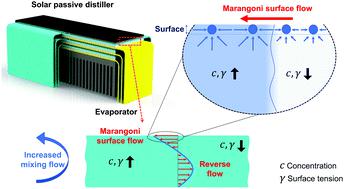当前位置:
X-MOL 学术
›
Energy Environ. Sci.
›
论文详情
Our official English website, www.x-mol.net, welcomes your feedback! (Note: you will need to create a separate account there.)
Solar passive distiller with high productivity and Marangoni effect-driven salt rejection
Energy & Environmental Science ( IF 32.5 ) Pub Date : 2020-09-14 , DOI: 10.1039/d0ee01440k Matteo Morciano 1, 2, 3, 4, 5 , Matteo Fasano 1, 2, 3, 4, 5 , Svetlana V. Boriskina 6, 7, 8, 9 , Eliodoro Chiavazzo 1, 2, 3, 4 , Pietro Asinari 1, 2, 3, 4, 10
Energy & Environmental Science ( IF 32.5 ) Pub Date : 2020-09-14 , DOI: 10.1039/d0ee01440k Matteo Morciano 1, 2, 3, 4, 5 , Matteo Fasano 1, 2, 3, 4, 5 , Svetlana V. Boriskina 6, 7, 8, 9 , Eliodoro Chiavazzo 1, 2, 3, 4 , Pietro Asinari 1, 2, 3, 4, 10
Affiliation

|
Inadequate water supply, sanitation and hygiene in remote locations, developing countries, and disaster zones fuel the growing demand for efficient small-scale desalination technologies. The aim is to provide high-quality freshwater to water-stressed and disaster-stricken communities even in the absence of energy infrastructure. The major key drivers behind the development of these technologies are the low cost of materials, the flexibility of the technology, the sustainability of the freshwater production, and the long-term stability of the device performance. However, the main challenge is to achieve stable performance by either preventing or mitigating salt accumulation during the desalination process. We present a multistage passive solar distiller whose key-strength is an optimized geometry leading to enhanced water yield (as compared to similar state of the art technologies) and spontaneous salt rejection. A comprehensive theoretical study is conducted to explain the apparently paradoxical experimental effective transport exceeding classical diffusion by two orders of magnitude. In our study, the Marangoni effect is included at the water–air interface and it stems from spatial gradients of surface tension. Interestingly, theoretical and experimental results demonstrate that the device is able to reject overnight all the salt accumulated on each evaporator during daytime operation. Furthermore, under realistic conditions, a distillate flow rate of almost 2 L m−2 h−1 from seawater at less than one sun illumination has been experimentally observed. The reported mechanism of the enhanced salt rejection process may have tremendous implications in the desalination field as it paves the way to the design of a new generation of hydrophilic and porous materials for passive thermal desalination. We envision that such a technology can help provide cheap drinking water, in a robust way, during emergency conditions, while maintaining stable performance over a long time.
更新日期:2020-10-14


























 京公网安备 11010802027423号
京公网安备 11010802027423号